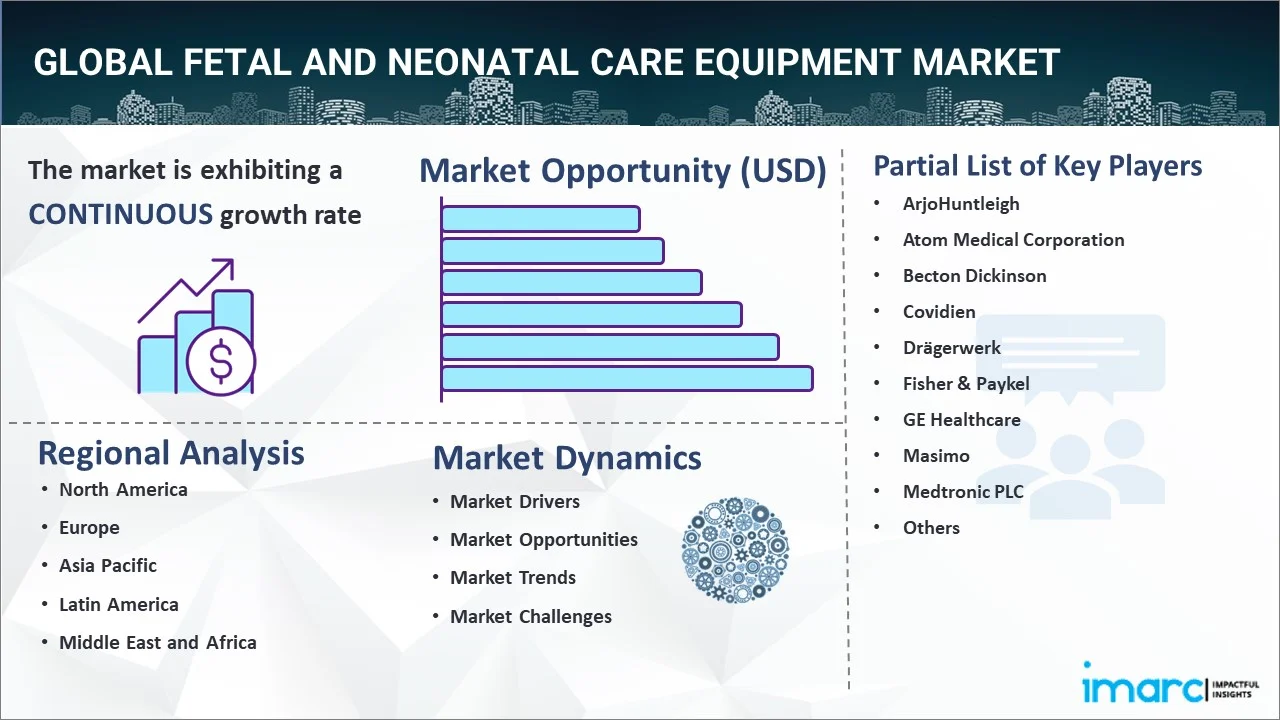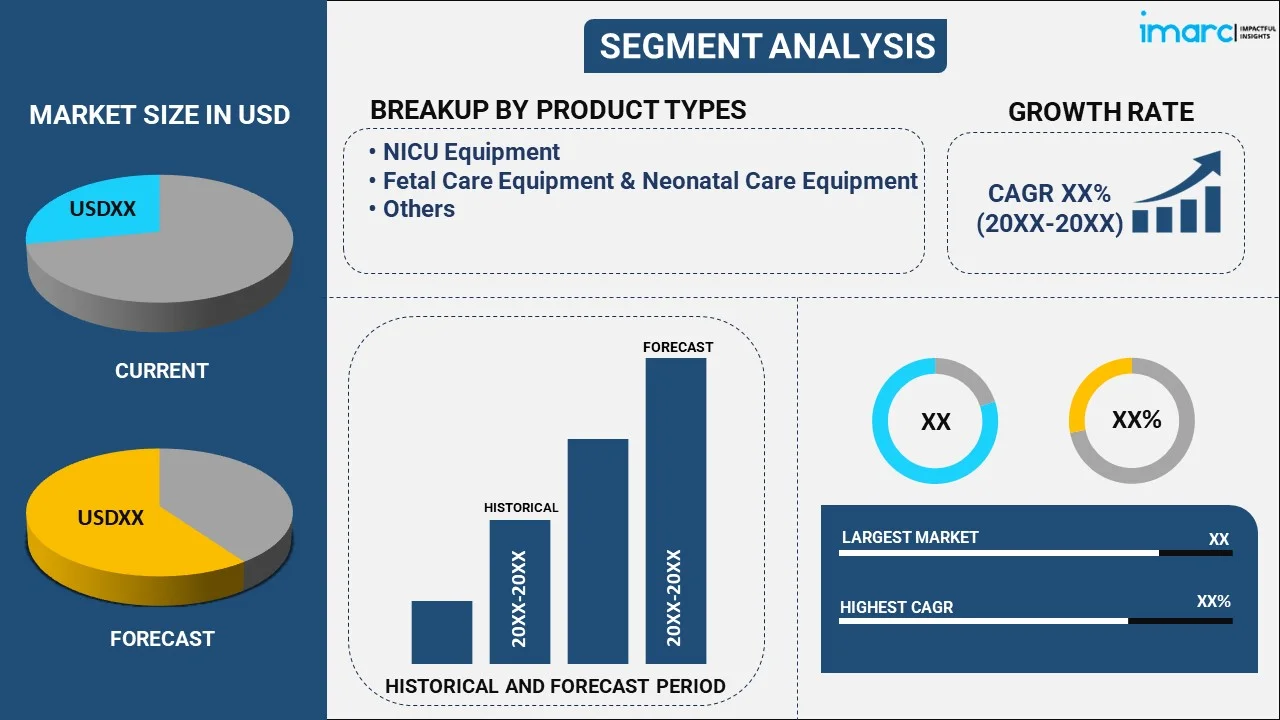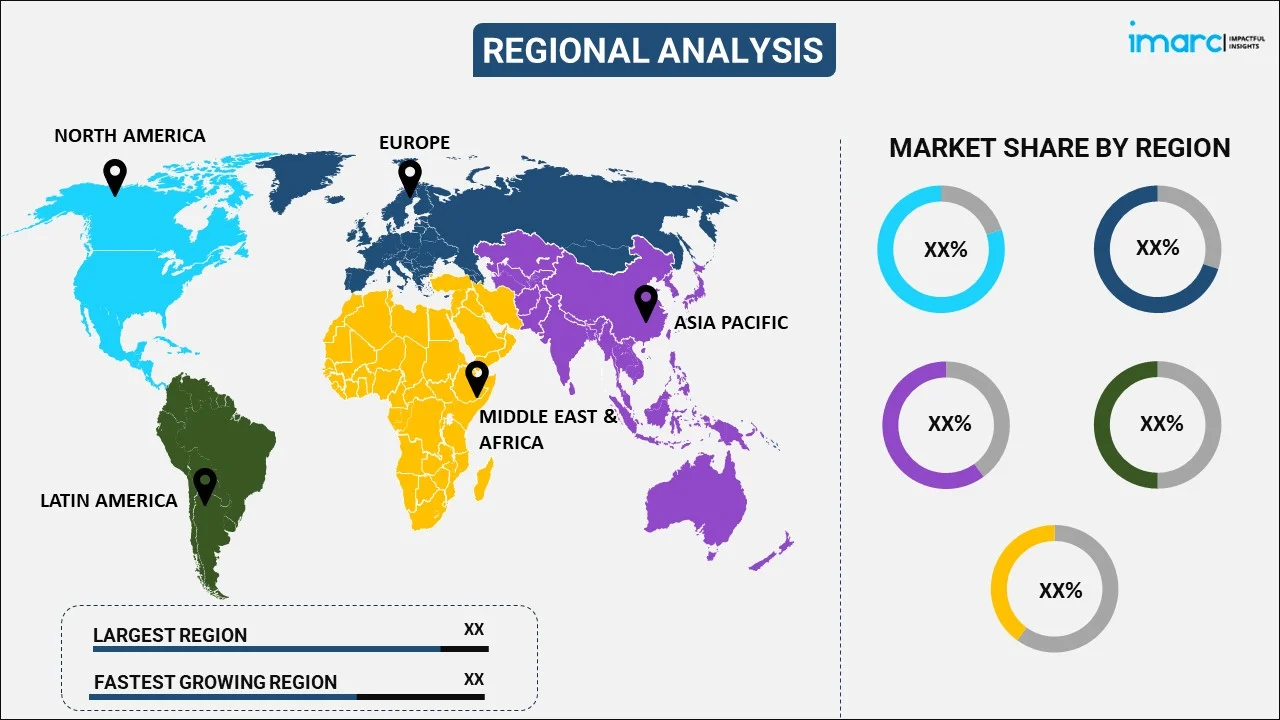
Fetal and Neonatal Care Equipment Market Report by Product Type (NICU Equipment, Fetal Care Equipment & Neonatal Care Equipment, and Others), End-User (Hospitals, Diagnostic Centers, Clinics, and Others), and Region 2025-2033
Market Overview:
The global fetal and neonatal care equipment market size reached USD 9.5 Billion in 2024. Looking forward, IMARC Group expects the market to reach USD 17.2 Billion by 2033, exhibiting a growth rate (CAGR) of 6.56% during 2025-2033. At present, North America accounts for the largest market share due to its highly advanced healthcare infrastructure with well-established hospitals and specialized neonatal care centers.
|
Report Attribute
|
Key Statistics
|
|---|---|
|
Base Year
|
2024 |
|
Forecast Years
|
2025-2033 |
|
Historical Years
|
2019-2024
|
|
Market Size in 2024
|
USD 9.5 Billion |
|
Market Forecast in 2033
|
USD 17.2 Billion |
| Market Growth Rate 2025-2033 | 6.56% |
The fetal and neonatal care (FNC) equipment are specialized devices that are used to diagnose, monitor and treat diseases and medical ailments of the fetus and newborn babies. These devices are crucial for routine check-ups in gynecology and obstetrics interventions. Ultrasound devices, fetal dopplers, fetal MRI systems, incubators, phototherapy and respiratory devices are some of the most extensively utilized FNC equipment. They also find applications in the Neonatal Intensive Care Units (NICUs) for the treatment of ailments, including anemia, bronchopulmonary dysplasia, intraventricular hemorrhage, hyperbilirubinemia and transient tachypnea.

The increasing prevalence of hospital-acquired neonatal ailments and complications is one of the key factors driving the growth of the market. Furthermore, the rising cases of premature birth with low immunity and weight are contributing to the increasing requirement of FNC equipment across the globe. Maternal and fetal care is rapidly becoming a global priority to prevent fatalities during pregnancy and childbirth. Additionally, technological advancements and innovations in patient monitoring, respiratory, and phototherapy devices aimed at making them more user-friendly, cost-effective and highly accurate, are providing a boost to the market. Moreover, equipment features such as light-weight, compact designs and remote monitoring facilities are further increasing product adoption in medical institutions. Other factors, including improving fertility rate, efforts by both government and non-government organizations (NGOs) to create awareness for fetal and neonatal care and extensive research and development (R&D), are projected to drive the market further.
Key Market Segmentation:
IMARC Group provides an analysis of the key trends in each sub-segment of the global market report, along with fetal and neonatal care equipment market forecasts at the global, regional and country level from 2025-2033. Our report has categorized the market based on product type and end-user.
Breakup by Product Type:

- NICU Equipment
- Incubators
- Neonatal Monitoring Devices
- Phototherapy Equipment
- Respiratory Assistance and Monitoring Devices
- Others
- Fetal Care Equipment & Neonatal Care Equipment
- Fetal Dopplers
- Fetal MRI Devices
- Fetal Ultrasound Devices
- Fetal Pulse Oximeters
- Others
- Others
NICU equipment accounts for the majority of the market share
The report has provided a detailed breakup and analysis of the market based on the product type. This includes NICU Equipment (Incubators, Neonatal Monitoring Devices, Phototherapy Equipment, Respiratory Assistance and Monitoring Devices, and Others), Fetal Care Equipment & Neonatal Care Equipment (Fetal Dopplers, Fetal MRI Devices, Fetal Ultrasound Devices, Fetal Pulse Oximeters, and Others), and Others. According to the report, NICU equipment represents the largest segment.
Premature babies and neonates with significant health conditions require intense and specialized care. NICU equipment, such as ventilators, incubators, and monitoring systems, is critical for treating respiratory, cardiovascular, and other life-threatening diseases, resulting in high demand in hospitals and healthcare facilities. There is a rise in the frequency of premature births worldwide, which is catalyzing the demand for NICU services. Premature newborns are frequently born with undeveloped organs and require NICU care to maintain crucial functions in the early stages of life. Continuous advancements in NICU equipment, such as more efficient incubators, better respiratory support systems, and high-precision monitoring instruments, are broadening their applications and capacities, resulting in increased acceptance in newborn care settings.
Breakup by End-User:
- Hospitals
- Diagnostic Centers
- Clinics
- Others
Hospitals hold the largest share of the industry
The report has provided a detailed breakup and analysis of the market based on the end user. This includes hospitals, diagnostic centers, clinics, and others. According to the report, hospitals account for the largest market share.
Hospitals offer the most complete care to both mothers and newborns, with specialist departments, such as neonatal intensive care units (NICUs) and maternity wards. These hospitals are outfitted with modern fetal and newborn care equipment that other healthcare facilities may lack. Hospitals handle a higher volume of births than smaller healthcare facilities, making them the principal users of fetal and neonatal care supplies. They handle both regular deliveries and high-risk pregnancies, requiring constant access to specialist neonatal equipment. Most hospitals, particularly tertiary care centers and large urban hospitals, have NICUs for treating premature and severely ill neonates. NICU equipment, such as incubators, ventilators, and monitors, is critical for neonatal health management, making hospitals prime customers of these products. Hospitals also employ qualified experts like neonatologists, pediatricians, and specialized nurses who have received training in the use of advanced fetal and neonatal care technology.
Breakup by Region:

- North America
- United States
- Canada
- Europe
- Germany
- France
- United Kingdom
- Italy
- Spain
- Russia
- Others
- Asia Pacific
- China
- Japan
- India
- South Korea
- Australia
- Indonesia
- Others
- Latin America
- Brazil
- Mexico
- Argentina
- Colombia
- Chile
- Peru
- Others
- Middle East and Africa
- Turkey
- Saudi Arabia
- Iran
- United Arab Emirates
- Others
North America leads the market, accounting for the largest fetal and neonatal care equipment market share
The report has also provided a comprehensive analysis of all the major regional markets, which include North America (the United States and Canada); Europe (Germany, France, the United Kingdom, Italy, Spain, Russia, and others); Asia Pacific (China, Japan, India, South Korea, Australia, Indonesia, and others); Latin America (Brazil, Mexico, Argentina, Colombia, Chile, Peru, and others); and the Middle East and Africa (Turkey, Saudi Arabia, Iran, United Arab Emirates, and Others). According to the report, North America represents the largest regional market for fetal and neonatal care equipment.
North America is the largest market for fetal and neonatal care equipment due to several critical factors. The region has a highly advanced healthcare infrastructure, with well-established hospitals and specialized neonatal care centers equipped with the latest medical technologies. High healthcare expenditure, along with significant government funding and private investments in maternal and neonatal healthcare, are also impelling the market growth. Additionally, North America experiences a relatively high prevalence of preterm births and birth complications, catalyzing the demand for advanced NICU equipment and fetal monitoring systems. Technological advancements, including innovations in neonatal care devices, coupled with strong awareness of maternal and infant health, are further strengthening the market in this region. Moreover, the presence of major market players and favorable reimbursement policies for neonatal care services contribute to North America's dominance in the global fetal and neonatal care equipment market.
Competitive Landscape:
The competitive landscape of the industry has also been examined with some of the key players being ArjoHuntleigh, Atom Medical Corporation, Becton Dickinson, Covidien, Drägerwerk, Fisher & Paykel, GE Healthcare, Masimo, Medtronic PLC, Natus Medical Incorporated, Philips Healthcare, Phoenix Medical Systems, Smiths Medical, Spacelabs Healthcare, Utah Medical Products and Vyaire Medical Inc.
Report Coverage:
| Report Features | Details |
|---|---|
| Base Year of the Analysis | 2024 |
| Historical Period | 2019-2024 |
| Forecast Period | 2025-2033 |
| Units | Billion USD |
| Segment Coverage | Product Type, End-User, Region |
| Region Covered | Asia Pacific, Europe, North America, Latin America, Middle East and Africa |
| Countries Covered | United States, Canada, Germany, France, United Kingdom, Italy, Spain, Russia, China, Japan, India, South Korea, Australia, Indonesia, Brazil, Mexico, Argentina, Colombia, Chile, Peru, Turkey, Saudi Arabia, Iran, United Arab Emirates |
| Companies Covered | ArjoHuntleigh, Atom Medical Corporation, Becton Dickinson, Covidien, Drägerwerk, Fisher & Paykel, GE Healthcare, Masimo, Medtronic PLC, Natus Medical Incorporated, Philips Healthcare, Phoenix Medical Systems, Smiths Medical, Spacelabs Healthcare, Utah Medical Products and Vyaire Medical Inc. |
| Customization Scope | 10% Free Customization |
| Post-Sale Analyst Support | 10-12 Weeks |
| Delivery Format | PDF and Excel through Email (We can also provide the editable version of the report in PPT/Word format on special request) |
Key Questions Answered in This Report
The global fetal and neonatal care equipment market was valued at USD 9.5 Billion in 2024.
We expect the global fetal and neonatal care equipment market to exhibit a CAGR of 6.56% during 2025-2033.
The rising cases of premature birth and neonatal complications, along with the growing demand for FNC equipment to diagnose, monitor, and treat the fetus and newborn babies, are primarily driving the global fetal and neonatal care equipment market.
The sudden outbreak of the COVID-19 pandemic has led to the rising demand for fetal and neonatal care equipment to treat pregnant women, lactating mothers, and newborn babies owing to their high susceptibility to the coronavirus disease.
Based on the product type, the global fetal and neonatal care equipment market has been segregated into NICU equipment, fetal care equipment & neonatal care equipment, and others. Among these, NICU equipment, including neonatal monitoring devices, currently account for the majority of the global market share.
Based on the end user, the global fetal and neonatal care equipment market can be bifurcated into hospitals, diagnostic centers, clinics, and others. Currently, hospitals exhibit a clear dominance in the market.
On a regional level, the market has been classified into North America, Asia Pacific, Europe, Latin America, and Middle East and Africa, where North America currently dominates the global market.
Some of the major players in the global fetal and neonatal care equipment market include ArjoHuntleigh, Atom Medical Corporation, Becton Dickinson, Covidien, Drägerwerk, Fisher & Paykel, GE Healthcare, Masimo, Medtronic PLC, Natus Medical Incorporated, Philips Healthcare, Phoenix Medical Systems, Smiths Medical, Spacelabs Healthcare, Utah Medical Products, Vyaire Medical Inc., etc.
Need more help?
- Speak to our experienced analysts for insights on the current market scenarios.
- Include additional segments and countries to customize the report as per your requirement.
- Gain an unparalleled competitive advantage in your domain by understanding how to utilize the report and positively impacting your operations and revenue.
- For further assistance, please connect with our analysts.
 Request Customization
Request Customization
 Speak to an Analyst
Speak to an Analyst
 Request Brochure
Request Brochure
 Inquire Before Buying
Inquire Before Buying




.webp)




.webp)












